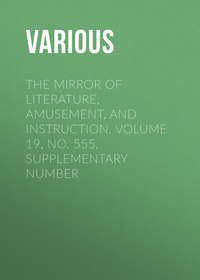The Mirror of Literature, Amusement, and Instruction. Volume 19, No. 555, Supplementary Number

Полная версия
Добавить В библиотекуАвторизуйтесь, чтобы добавить
Добавить отзывДобавить цитату
The Mirror of Literature, Amusement, and Instruction. Volume 19, No. 555, Supplementary Number
Авторизация